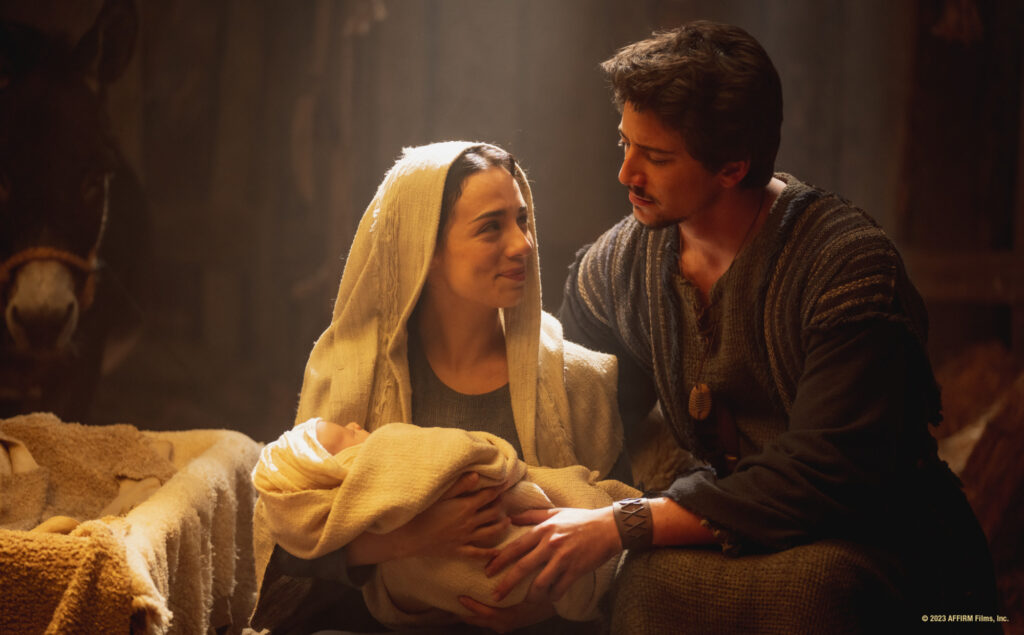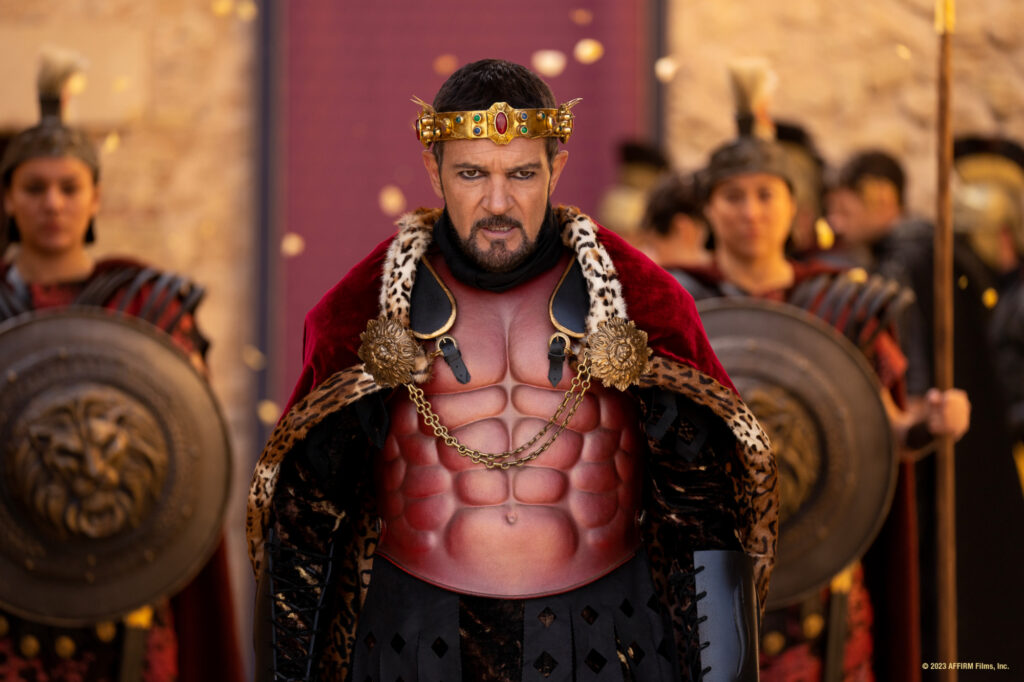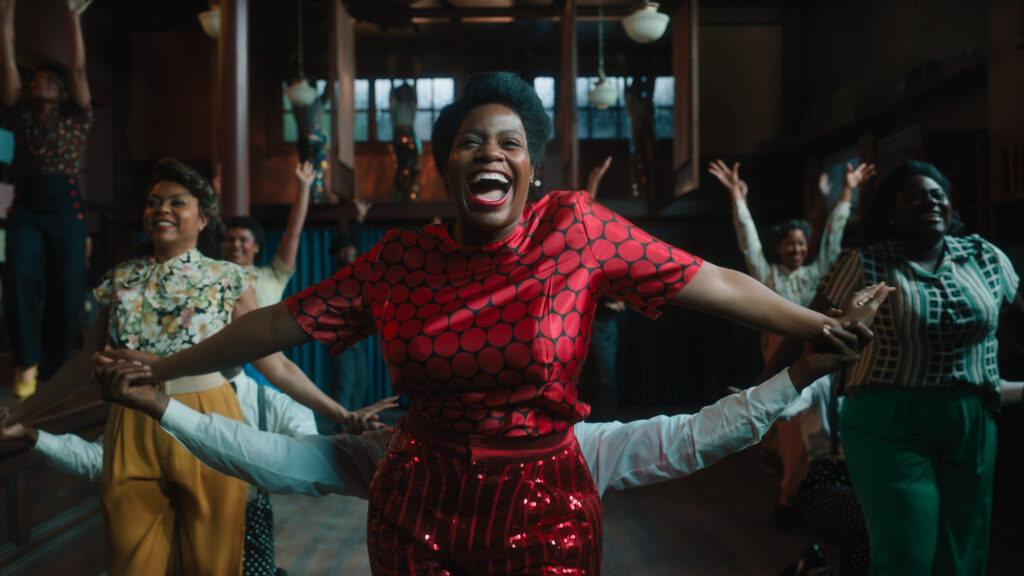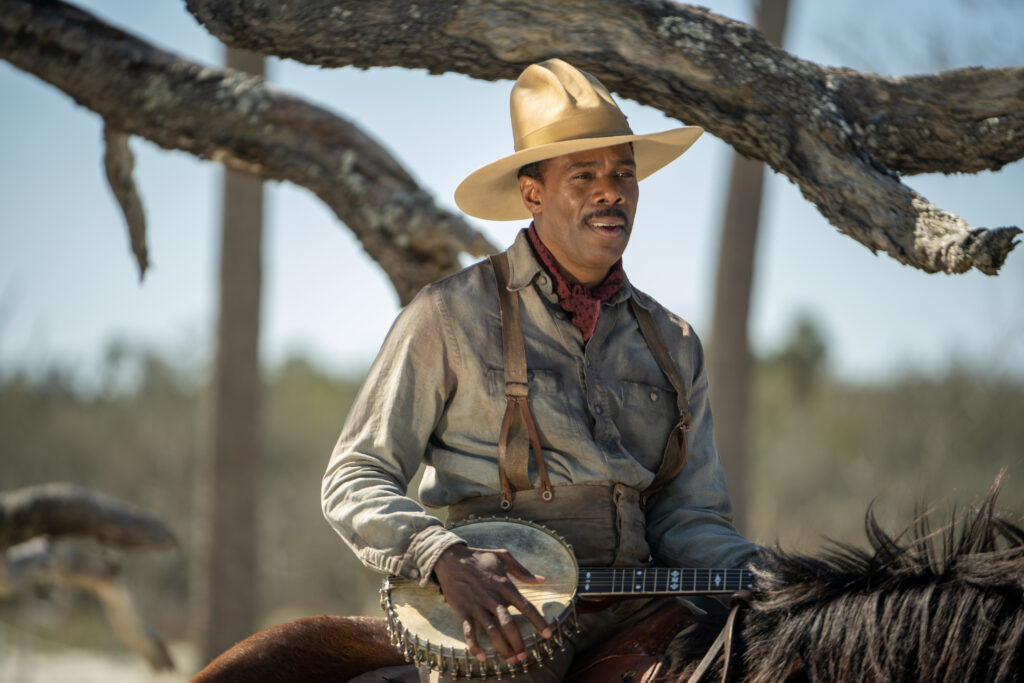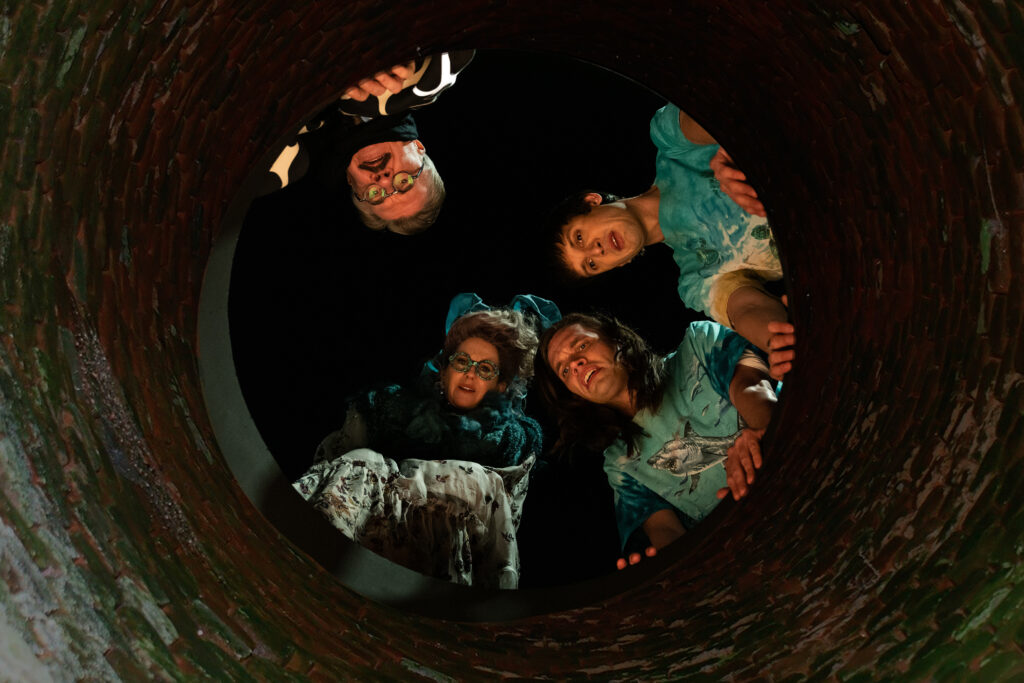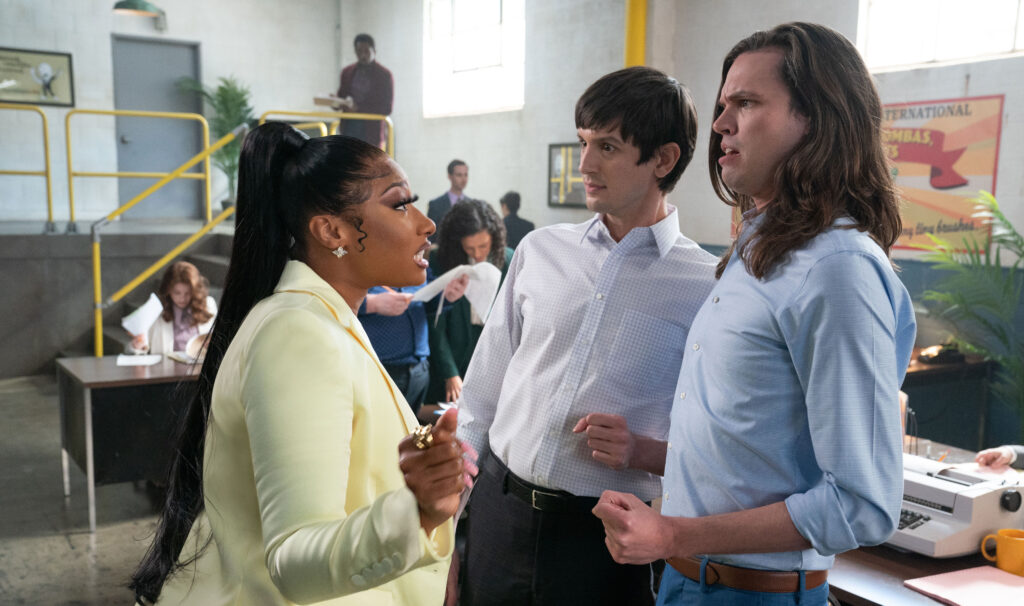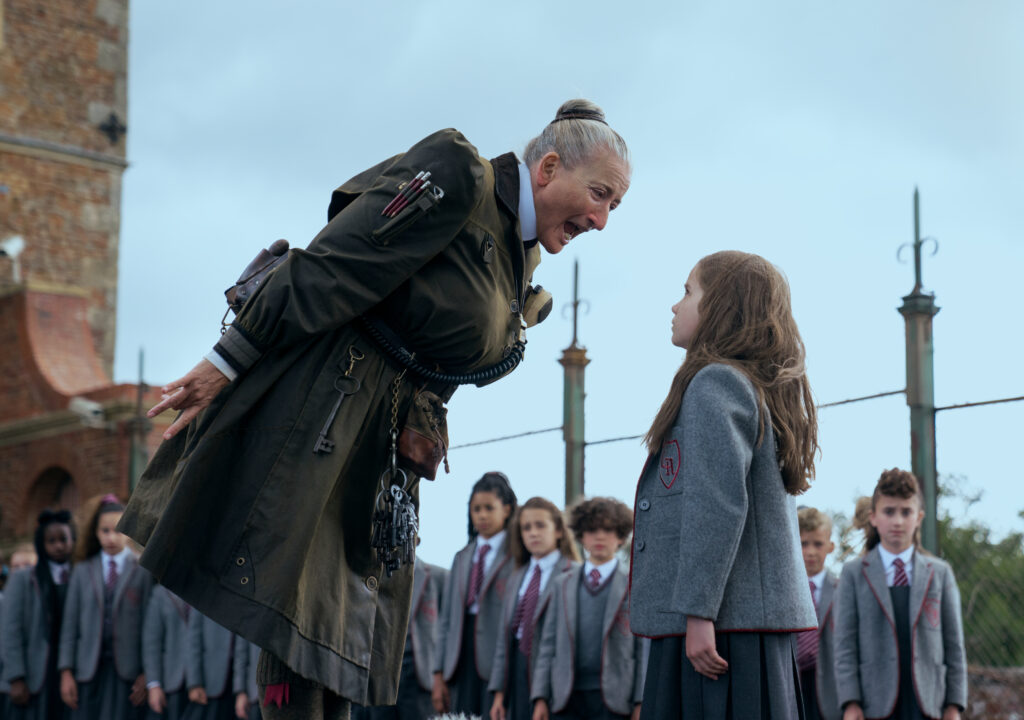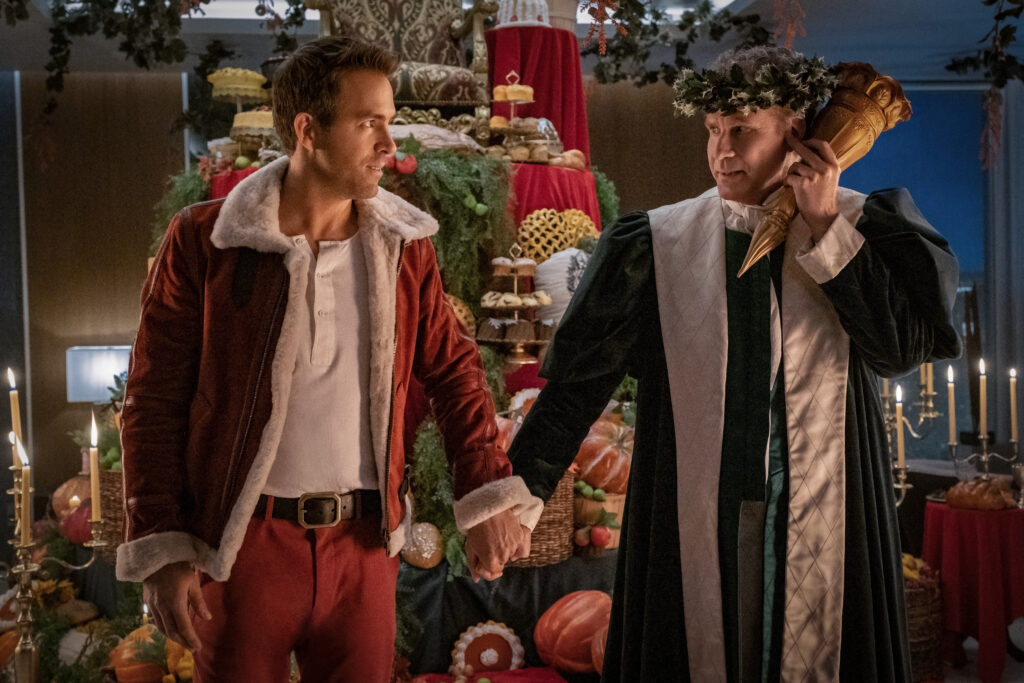January 13, 2024
by Carla Hay

Directed by Samantha Jayne and Arturo Perez Jr.
Culture Representation: Taking place in Evanston, lllinois, the musical film “Mean Girls” (adapted from the “Mean Girls” stage musical, which is based on 2004 “Mean Girls” movie) features a predominantly white cast of characters (with some African Americans, Asians and Latinos) representing the working-class, middle-class and wealthy.
Culture Clash: A new transfer student in high school infiltrates a popular clique to sabotage the clique’s bullying leader, but the interloper becomes just as bad as the bully.
Culture Audience: “Mean Girls” will appeal primarily to fans of screenwriter/co-star Tina Fey, the original 2004 movie, the “Mean Girls” stage musical and comedic musical movies about teenage life that don’t have many surprises.

Although not as funny as the 2004 “Mean Girls” movie, this musical version is still entertaining overall, despite a few missteps. The cast members’ performances are better than the songs. If you’re inclined to dislike musicals, then “Mean Girls” is probably isn’t going to change your mind. However, for people who are like or tolerate musicals, this version of “Mean Girls” will probably be enjoyable enough to not feel like a complete waste of time.
Directed by Samantha Jayne and Arturo Perez Jr., “Mean Girls” is adapted from the “Mean Girls” stage musical, which is based on the 2004 “Mean Girls” movie. Tina Fey wrote the screenplays for both “Mean Girls” movies, as well as the book for the “Mean Girls” stage musical, which was on Broadway from 2018 to 2020. The COVID-19 pandemic essentially killed “Mean Girls” on Broadway when Broadway theaters were shut down from March 2020 to September 2021, but a touring version of “Mean Girls” still exists.
The “Mean Girls” movie was inspired by Rosalind Wiseman’s 2002 self-help book “Queen Bees and Wannabes.” And when the 2004 “Mean Girls” movie (starring Lindsay Lohan and directed by Mark Waters) was released, it was often described as a more family-friendly version of 1989’s dark comedy “Heathers” (starring Winona Ryder and directed by Michael Lehmann), because it had a similar story: A new transfer student in high school goes from being unpopular outcast to being accepted into the school’s most popular (and snobbiest) clique to replacing the “queen bee” of the clique. There’s also the vastly forgettable 2011 made-for-TV sequel “Mean Girls 2,” which was televised on the network then known as ABC Family.
In other words, there isn’t much of anything that’s original in this movie musical version of “Mean Girls,” which is updated from the 2004 “Mean Girls” movie by having a more racially diverse principal cast and having social media incorporated into the story. People who’ve seen the original “Mean Girls” movie and/or the “Mean Girls” stage musical will be curious to see how this “Mean Girls” musical movie is different. There are no bold and innovative changes.
The 2024 version of “Mean Girls” keeps the story of how 16-year-old Cady Heron (played by Angourie Rice), who is the only child of American parents, has been homeschooled in Kenya for most of life. When she and her family move back to the United States, Cady transfers to North Shore High School in Evanston, Illinois. (This version of “Mean Girls” was actually filmed in New Jersey.)
In the original “Mean Girls” movie, Cady is being raised by two married parents. In the “Mean Girls” musical movie, Cady is being raised by a single mother (played by Jenna Fischer), who doesn’t have a first name in the movie. Cady’s mother was a teacher in Kenya and has accepted a job at Northwestern University. There is no mention of Cady’s father in 2024’s “Mean Girls,” but the Cady character in both movies comes from a loving and supportive household.
In 2004’s “Mean Girls,” Cady was the narrator. In the 2024’s “Mean Girls,” the narrators are sassy Damian Hubbard (played by Jaquel Spivey) and cynical Janis ‘Imi’ike (played by Auliʻi Cravalho), two openly queer students and best friends at North Shore High School. Damian and Janis are in the movie’s opening scene, where they are shown recording a music video called “Cautionary Tale” on a phone. Janis is singing playing guitar, while Damian is singing and playing the tambourine.
It’s an introduction for Damian and Janis to tell the story of Cady and how she shook up the social hierarchy at North Shore High School. During Cady’s first few days at school, she is shunned or ignored by most of the students, except for Damian and Janis, who are also social outsiders at the school. Cady welcomes the friendship of Damian and Janis, who both tell Cady how much they dislike an all-girl clique at the school called the Plastics, who are the most elitist and popular clique in the school. A few years before, Regina (Janis’ former best friend) “outed” Janis as a lesbian, and it caused Janis to be the target of homophobic harassment.
The Plastics are physically pretty but they have the ugly personalities of being snobs and bullies. The leader of the Plastics is “queen bee” Regina George (played by Reneé Rapp), who only seems to be popular because of her looks and because she comes from a rich family. The other Plastics are Regina’s sidekicks: gossipy Gretchen Wieners (played by Bebe Wood) and dimwitted Karen Shetty (played by Avantika), who basically do whatever Regina wants them to do. The Plastics have certain dress code rules that Regina has dictated, such as they have to wear pink on Wednesdays, and they can only wear casual sweat clothing on Fridays.
One day, Regina invites Cady to sit with the Plastics at a table in the school’s cafeteria. It’s a rare invitation that immediately catches the attention of other students. Regina’s original intention is to insult and embarrass Cady. But when Regina sees how friendly and unthreatening Cady is, Regina decides that she can manipulate and control Cady into becoming one of the Plastics.
Meanwhile, Cady (who is a math whiz) gets an instant crush on an attractive guy who sits in front of her in their AP calculus class: Aaron Samuels (played by Christopher Briney), who happens to be Regina’s ex-boyfriend. Cady, who is bashful when talking to Aaron, doesn’t find out until after she has feelings for him that Aaron and Regina used to be a couple. Cady also finds out that Aaron was the one who dumped Regina, who wants to get back together with him.
“Mean Girls” writer/co-star Fey reprises her role as Ms. Norbury, the school’s AP calculus teacher. Tim Meadows also returns as North Shore High School principal Mr. Duvall. Just like in 2004’s “Mean Girls,” on Cady’s first day at North Shore, Mr. Duvall introduces Cady to her homeroom class, which is taught by Ms. Norbury. However, in 2024’s “Mean Girls,” Mr. Duvall and Ms. Norbury are now a couple, which was a romance that was hinted at the end of 2004’s “Mean Girls.”
Damian and Janis want to get revenge on Regina, so they urge Cady to join the Plastics clique, with the intention to sabotage Regina’s life. Part of their plan is have Cady get together with Aaron, so that Regina’s heart will be broken. Cady eagerly goes along with this plan because she wants Aaron for herself. For much of the movie, Cady is part of the Plastics, while secretly maintaining a friendship with Damian and Janis.
Soon after Regina has decided that Cady will be part of the Plastics, she invites Cady to hang out with her, Gretchen and Karen in Regina’s home. It’s here that Regina shows Cady her secret Burn Book, a pink, photo-album-sized book that has photos of people in the school with vicious insults written next to each photo. This notorious Burn Book predictably becomes a major source of conflict in the story.
Regina’s mother Mrs. George (played by Busy Philipps) is a ditzy, eager-to-please parent, who spoils Regina and acts like she wants to be Regina’s best friend. In both “Mean Girls” movies, Ms. George is one of the funniest characters, but her screen time is limited. That’s because the teenage perspective is the driving force of “Mean Girls,” which goes through the expected story beats of friendship betrayals and academic challenges, in backdrops such as classrooms, a school dance and the sterotypical teenage house party with no parents at home.
Although the cast members of the “Mean Girls” movie musical are all very talented, they don’t have the same special chemistry of the cast in 2004’s “Mean Girls.” The 2024 movie version of “Mean Girls” also doesn’t do anything new or interesting with the supporting characters, who drift in and out of the story in ways that don’t look as natural as they were in 2004’s “Mean Girls.” And because 2024’s “Mean Girls” is a musical, it uses hyper-realism during the musical numbers that takes a lot of bite out of the sharp comedy that 2004’s “Mean Girls” had.
Kevin Ganatra (played by Mahi Alam), the leader of the school’s math club, is the same type of nerdy character as the Kevin Gnapoor character (played by Rajiv Surendra) in 2004’s “Mean Girls.” He flirts with Cady but ends up with another student at the end of the movie. (The 2024 version “Mean Girls” changes who that student is.)
The other teachers at North Shore have very quick cameos, none of which are crucial to the story. These scenes could have been much better. Physical education teacher Coach Carr (played by Jon Hamm) teaches sex education and makes inappropriate comments that fall flat as jokes. French teacher Madame Park (played by Ashley Park, who played Gretchen in the “Mean Girls” stage musical) has a not-very-funny scene of her telling Damian to pick a French name for him to use in class. Literature teacher Mr. Rapp (played by Connor Ratliff) is mostly forgettable.
Jason Weems (played by John El-Jor) is a mischievous brat who is Gretchen’s love interest. However, his character is very underdeveloped in 2024’s “Mean Girls,” compared to the larger and funnier role that the Jason character (played by Daniel DeSanto) had in 2004’s “Mean Girls.” The Aaron character is blander in 2024’s “Mean Girls” than the Aaron character (played by Jonathan Bennett) in 2004’s “Mean Girls.” Gretchen (played by Lacey Chabert in 2004’s “Mean Girls”) is also still the same character in both movies, with no real dialogue improvement.
Worst of all, the character of Karen is made even more vapid in 2024’s “Mean Girls,” in ways that aren’t very funny and are borderline offensive. Karen Smith (played by Amanda Seyfried), one of the Plastics in 2004’s “Mean Girls,” wasn’t smart either, but at least had more of a personality and amusing lines of dialogue. The Karen in 2024’s “Mean Girls” has the personality of a blank space.
Original “Mean Girls” star Lohan makes an unremarkable cameo as a moderator for a math competition. It’s a squandered opportunity. The lines of dialogue that she has are very dull, with one only small sly nod to Lohan’s real-life troubles that tarnished her reputation and acting career. A better cameo for Lohan would have had her as a North Shore teacher or a parent of one of the North Shore students.
Damian in 2024’s “Mean Girls” is campier than in 2004’s “Mean Girls,” while Janis in 2024’s “Mean Girls” isn’t as hot-tempered as the Janis in 2004’s “Mean Girls.” In 2004’s “Mean Girls” Janis is presented as a heterosexual who was offended at being misidentified as a lesbian. Janis in 2024’s “Mean Girls” is really a lesbian and has a love interest named Grace Porter (played by Morgen McKynzie), who is a student at North Shore and barely says anything in the movie. It makes Grace look like a token.
As for the musical numbers, they are well-performed by the cast members (Rapp and Cravalho are the standout singers), but the movie switches to fantasy staging during the musical sequences. This abrupt shift in tone might be off-putting to some viewers. The sight of fake wind blowing through people’s hair, or school hallways having disco-ball-type lighting during song-and-dance numbers will be something that people might or might not find hard to take in a “Mean Girls” story.
The songs (music by Jeff Richmond, lyrics by Nell Benjamin) are good, but not outstanding. An original song called “What Ifs” (co-written with Rapp) replaces “It Roars” as the first song that Cady sings. For time-length reasons, there are less songs in the movie musical than in the stage musical, which has 18 songs.
“Stupid With Love” is still a showstopper, while Regina’s anthem “Someone Gets Hurt” is a definite highlight. The songs from the “Mean Girls” stage musical that aren’t in the “Mean Girls” movie musical are “Where Do You Belong?,” “Fearless,” “Stop,” “Whose House Is This?,” “More Is Better” and “Do This Thing.” Janis doesn’t get her time shine with a solo lead vocal (“I’d Rather Be Me”) until the movie is almost over, which is something that the movie should have corrected by giving Janis an original song showcase much earlier in the story.
In the talent show scene, Damian sings the theme to “iCarly,” compared to the 2004 movie, which had the better choice of Christina Aguilera’s “Beautiful” as the song that Damian sings in the talent show. In the 2024 “Mean Girls” movie, “Rockin’ Around the Pole” is the song choice for the Plastics’ talent show performance, which is an inferior replacement for “Jingle Bell Rock,” the song that the Plastics performed in the 2004 “Mean Girls” talent show scene. Megan Thee Stallion, who has a cameo as herself during the 2024 “Mean Girls” movie’s social-media montages, teamed up with Rapp for the soundtrack single “Not My Fault,” which is not performed in a musical scene in the movie, but it’s the type of original change that the movie needed.
Rapp’s version of Regina (she also played the role on Broadway from 2019 to 2020) is much more of a sneering and obvious villain than Rachel McAdams’ version of Regina in 2004’s “Mean Girls.” They are different but equally effective performances. Rice is quite good in her role as Cady, but it would be difficult for most people to surpass Lohan’s iconic performance in “Mean Girls,” the movie that was the high point of Lohan’s career in the 2000s.
The showdown between Regina and Cady in 2004’s “Mean Girls” was much more fun to watch than in the 2024 version, which makes a change to a certain bus-accident scene that probably won’t sit well with some fans of the 2004 movie. However, the 2024 version of “Mean Girls” was wise enough to keep some of the more famous catch-phrases from the 2004 movie. One of them is “Stop trying to make ‘fetch’ happen.”
The 2024 version of “Mean Girls” is the feature-film debut of directors Jayne and Perez, who are frequent collaborators. They bring an upbeat and candy-coated style to the “Mean Girls” story, which is well-suited for a musical. The costume design in 2004’s “Mean Girls” had better taste and still looks good decades later, compared to the overly trendy (and sometimes trashy-looking) costume design of 2024’s “Mean Girls. Fans of the original “Mean Girls” movie might miss the funnier jokes and the edgier undertones that the 2004 movie had. The 2024 “Mean Girls” movie plays it safe, but should satisfy viewers who want to watch a comedic musical that has expected outcomes.
Paramount Pictures released “Mean Girls” in U.S. cinemas on January 12, 2024. The movie will be released on digital and VOD on February 20, 2024. The 2004 and 2024 versions of “Mean Girls” will also be available in a two-movie collection on digital on February 20, 2024. “Mean Girls” (2024) will be released on 4K Ultra HD, Blu-ray and DVD on April 30, 2024, the same date that “Mean Girls” (2004) will be released on 4K Ultra HD.

